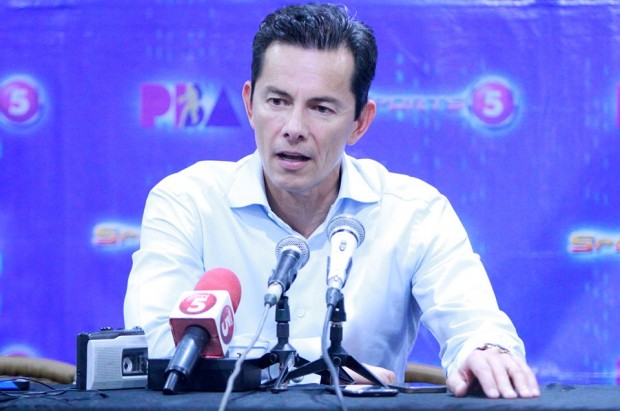Uytengsu gifts the PBA with a piece of advice; league can help him leave a more tangible present

The words tossed around by fans and haters of the Alaska Aces when they learned that the franchise was playing its final tournament in the Philippine Basketball Association—“Honor,” “Integrity,” “Played by the rules”—reflect a collective mourning for the looming departure of a team that had been a thorn to several of the league’s popular ball clubs.
Understandable. For those fans, it seemed that the PBA had lost its moral fulcrum, a voice in the all-powerful Board of Governors that always reminded its members: “Think league.”
“We always try to win with integrity, we try to respect our opponents. Hopefully history would judge that we did [things] the right way at Alaska,” team owner Wilfred Steven Uytengsu told reporters gathered virtually in an online press conference. “Would I change anything? I’m proud of the way we ran the franchise. I’m proud of our transparency and honesty.”
In announcing his team’s departure from the league after 35 seasons, Uytengsu left its officials an urgent plea neatly wrapped in his farewell message.
“I hope we are leaving the PBA in a good place,” Uytengsu said. “But I think in order for the league to continue to be healthy, you need to see a level playing field. I think that’s important.”
“Think league,” he urged PBA officials one last time.
Alaska’s slated departure further severs today’s PBA from its roots. Uytengsu was bred in a board where team owners like Joey Concepcion of RFM and Vicente Santos of Sta. Lucia sat as governors. They fostered a board culture geared toward making sure every team was equipped with the capacity to win a championship.
One of the the last of that old guard is leaving, and it will be up to the current board to navigate the league through a difficult test wrought by the pandemic.
“I know times are difficult for each team. Times are difficult for the league,” Uytengsu said.
Here’s how the PBA can make things easy: Allow Alaska to leave the PBA a valuable parting gift—someone to purchase Uytengsu’s franchise lock, stock and barrel.
Alaska governor Dickie Bachmann told the Inquirer that a P100-million price tag—at least—has been fastened to the franchise, a number that would zoom northward in a lock-stock-barrel transaction.
PBA chief Willie Marcial said a franchise sale is a “tedious process” but vowed to help Alaska find a buyer immediately. Already three buyers have approached him inquiring about the franchise. Two more have sent “serious’ feelers to Bachmann.
Marcial has set an April deadline for the sale of the franchise. Otherwise, the team reverts back to the PBA and its players will be dumped into a dispersal draft.
A company buying the entire Alaska franchise will spare the league from having to play with an odd number of teams (11). And it also does away with the need to fill that 12th slot with an expansion club.
Because it’s not just a matter of who fills up that 12th slot, if ever. It matters also when that buyer comes in.
Make the April deadline, there’s a chance that the new team takes over the Alaska franchise entirely. Beyond that, the buyer could end up an expansion club.
And right now, expansion clubs are a bane to parity.
The league is no longer set up in a way that expansion teams can build a championship contender from the ground up.
In 1990, the PBA welcomed its first expansion squads, Pepsi and Pop Cola. To strengthen both teams, the league allowed them to pick from an expansion pool of players unprotected by the existing six ball clubs. The six teams were allowed to keep the top nine players in their rotation.
Pepsi and Pop Cola were also given the second and third picks of the draft in the first and second round.
The league allowed the management of both teams to flex their team-building savvy with as much leeway as possible and it showed in the results: Pop Cola reached the finals the following season while Pepsi made the semifinals in that same year.
When Red Bull joined the league in 2000 as an expansion team, the franchise was allowed to carry six of its stalwarts from its amateur squad. The team won a championship the following year.
Such pathways to success for expansion teams are no longer navigable nowadays. When Kia and Blackwater joined the league in 2014, they picked from a pool culled from a “protect 12” policy. Not much quality there. They also picked 11th and 12th in the first round in the rookie draft.
The results speak for the weakness of the system: Eight years after joining the league, both clubs have combined for zero semifinals and finals appearances. Blackwater, as of this writing, is currently mired in a historic slump.
Uytengsu is hoping that Alaska’s departure doesn’t open the door for yet another doormat for powerful squads to dust their shoes on.
“I hope that everyone comes together to talk, think league first, and that the league continues to be successful,” Uytengsu said. “[Fans] are going to want to see the other teams not just making the playoffs but making the championships and winning one. I think that’s something for the league to think about going forward.”
There is still a remnant of the old guard, an official who has been around longer than Uytengsu and still carries the original PBA DNA–commissioner Marcial. And his help in getting a buyer in by April, and making the purchase a less tedious process, will be crucial in helping chart the league to the right direction.
(Francis T. J. Ochoa is the sports editor of the Philippine Daily Inquirer)